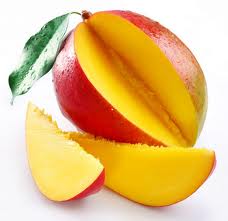 | Mango fruit is rich in pre-biotic dietary fiber, vitamins, minerals and poly-phenolic flavonoid antioxidant compounds. Mango peels are also rich in phytonutrients, such as the pigment antioxidants like carotenoids and polyphenols.
Vitamin A is also required for maintaining healthy mucus membranes and skin. Consumption of natural fruits rich in carotenes is known to protect body from lung and oral cavity cancers.and sweetness, mangoes contribute rich amounts of antioxidants -- nutrients that support your body's ability to resist and heal from infections and disease.
|
VITAMIN A
One cup of sliced mango provides 1,262 IU of vitamin A, which fulfills 25 percent of the recommended daily allowance for adults as well as for dogs. In addition to promoting a strong immune system, vitamin A plays an important role in vision, reproduction, bone growth, cell devision and healthy surface linings of your respiratory, intestinal and urinary tracts. The form of vitamin A in mangoes, known as betacarotene, provides potent antioxidant benefits, according to "American Dietetic Association Complete Food and Nutrition Guide" by St. Louis, Ohio-based dietitian Roberta Larson Duyff, and is believed to guard against skin disorders, certain diseases and the adverse effects of aging.
MANGIFERIN
Although mangiferin is a lesser-recognized nutrient in the general public, it has been deemed a "super-antioxidant" by scientists because of its superior disease-fighting properties. Mangiferin has inhibited tumor growth and reduced mucus buildup in rats and may guard against Parkinson's disease in humans and animals, according to a report published in "Comprehensive Reviews in Food Science and Food Safety" in Oct. 2008. Mango pulp contains 4.4 mg of mangiferin per kilogram. Its leaves, stem and peel contain significantly greater amounts.
QUERCETIN
Quercetin is an antioxidant and pigment that gives many flowers, vegetables and fruits their color. Quercetin acts as an antihistamine and anit-inflammatory, according to the University of Maryland Medical Center, and may lower your risk for cancer and heart disease. Mango pulp contains 22.1 mg of quercetin 3-galactoside per kilogram, 16 mg of quercetin 3-glucoside per kilogram and 5 mg of quercetin 3-arabinoside per kilogram. Mango peel also contains rich amounts of quercetin.
Fresh mango is a very rich source of potassium. Potassium in an important component of cell and body fluids that helps controlling heart rate and blood pressure.
It is also a very good source of vitamin-B6 (pyridoxine), vitamin-C and vitamin-E. Consumption of foods rich in vitamin C helps body develop resistance against infectious agents and scavenge harmful oxygen free radicals. Vitamin B-6 or pyridoxine is required for GABA hormone production in the brain. It also controls homocystiene levels in the blood, which may otherwise be harmful to blood vessels resulting in CAD and stroke.
Mango peels are also rich in phytonutrients, such as the pigment antioxidants like carotenoids and polyphenols.